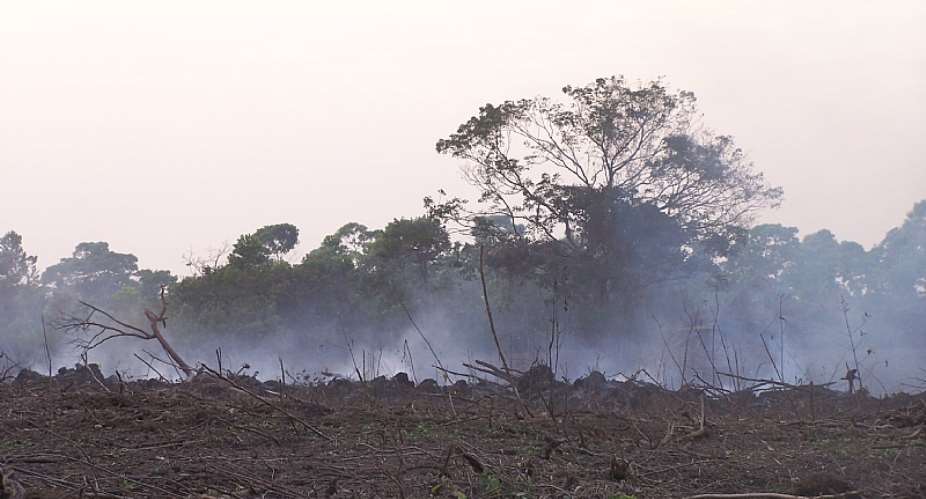August 30, 2019 (Silver Spring, MD) - There are wildfires and then there are fires.
Wildfires can occur for a number of reasons, and they are expected to increase as climate change leads to drier conditions and more uncontrollable blazes.
This is not what we are seeing in Brazil.
Today the Amazon burns as Brazilian agribusinesses and farmers clear forests for ranching operations and to grow livestock feed. As the world’s largest exporter of beef, it is no surprise that Brazil has loose restrictions regarding clearing – namely, slash-and-burn tactics.
Most of Brazil’s beef, corn, and soy is exported to Hong Kong and China: the beef is sold to consumers and the corn and soy is fed to livestock to make more beef (or pork) for consumers. Meat consumption in one hemisphere is at the expense of ecosystems on the other side of the planet, and this is true for many developed nations dependent on meat. Consider the United States: Despite having a climate capable of raising a variety of fruits and vegetables, the average American maintains a meat-heavy diet, consuming more than 200 pounds of beef a year. Producing for that market demand has resulted in a dead zone in the Gulf of Mexico the size of Massachusetts.
In the US and many regions of the world, soil is so degraded from generations of slash and burn farming, unsustainable land clearing, and chemical fertilizers that plant species can no longer grow – let alone thrive.
TREES knows that continuing degrading practices with promises to replant afterward will not work unless farmers stop the pressure that caused the deforestation in the first place. Trees that are half-heartedly replanted in degraded soil won’t survive because the growing conditions have changed from years of unsustainable farming practices.
The solution is clear: Agriculture stakeholders must end destructive practices like slash-and-burn and we all must work to repair degraded soils with intentional, sustainable methods. Trees for the Future (TREES) worked in Brazil for many years and used the same strategies we are applying today in Africa. We have learned to begin the revitalization process by using “pioneer trees” to rebuild the ecosystem. These trees are fast growing and can stand day-long heat and sun. Once they are established, they provide shade, cool the land, retain moisture, and make it possible for native biodiversity to return to the land.

(Above: Successful agroforestry practices stand in stark contrast next to neighboring fields still clearing and burning biomass.)
TREES believes that agroforestry – integrating trees in agriculture – is the only way to infuse sustainability into our food systems. We are teaching farmers to move away from destructive practices and it’s working. They are living healthy lives, they’re feeding their families, and they’re turning larger profits. TREES project farmers are successfully transforming their local and regional food systems.
I know that watching the lungs of the Earth go up in flames over these past few weeks is terrifying and I know it is overwhelming to decide where to go from here. But TREES is at the heart of the reconstruction of farmer-led deforestation, and we’re partnering with farmers to make it happen! We are working tirelessly to establish greater ‘lung capacity’ for our planet in Sub-Saharan Africa and we’ve made our methodology and training available to the public so that others can easily follow our lead.

If you’re like me and feel like the global community is not doing enough to combat the harms being done to one of the most spectacular ecosystems on the planet, join me in advocating for agroforestry and more sustainable farming practices. Visit training.trees.org to learn how to implement these practices in your own garden and consider supporting organizations that are working to rebuild a system that is clearly failing.
I hope you’ll join us in rolling up our sleeves to rebuild our planet’s lungs, together. Let’s take a collective deep breath and get to work!
John Leary
John Leary is the Executive Director of Trees for the Future and the award-winning author of “One Shot: Trees as our Last Chance for Survival.” Each purchase of “One Shot” plants 50 trees.





 Meta releases new version of conversational AI across its platforms
Meta releases new version of conversational AI across its platforms
 Cape Town named Africa’s Best Airport 2024 by Skytrax
Cape Town named Africa’s Best Airport 2024 by Skytrax
 Bono East: Four injured after hearse transporting corpse crashes into a truck
Bono East: Four injured after hearse transporting corpse crashes into a truck
 ‘Be courageous, find your voice to defend our democracy’ — Sam Jonah urges journ...
‘Be courageous, find your voice to defend our democracy’ — Sam Jonah urges journ...
 Exodus of doctors, nurses and teachers have worsened because of unserious Akufo-...
Exodus of doctors, nurses and teachers have worsened because of unserious Akufo-...
 2024 election: Avoid insults, cutting down people in search of power – National ...
2024 election: Avoid insults, cutting down people in search of power – National ...
 ‘You passed through the back door but congratulations’ — Atubiga on Prof Jane Na...
‘You passed through the back door but congratulations’ — Atubiga on Prof Jane Na...
 Government’s $21.1 billion added to the stock of public debt has been spent judi...
Government’s $21.1 billion added to the stock of public debt has been spent judi...
 Akufo-Addo will soon relocate Mahama’s Ridge Hospital to Kumasi for recommission...
Akufo-Addo will soon relocate Mahama’s Ridge Hospital to Kumasi for recommission...
 We must not compromise on our defence of national interest; this is the time to ...
We must not compromise on our defence of national interest; this is the time to ...
